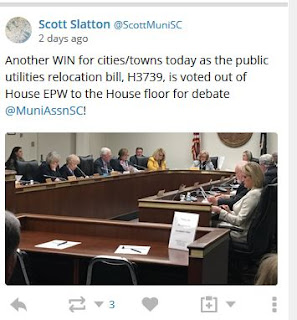By Commerce Secretary Bobby Hitt
On behalf of Governor Henry McMaster, the S.C. Department of
Commerce is pleased to announce that we will accept census tract nominations for
the recently announced economic development program called Opportunity Zones.
As a part of the Tax Cuts and Jobs Act of 2017, Opportunity Zones are designed
to encourage long-term private investments in low-income communities.This program provides a federal tax incentive for taxpayers
who reinvest unrealized capital gains into “Opportunity Funds,” which are
specialized vehicles dedicated to investing in low-income areas called
“Opportunity Zones.”
The zones themselves are to be comprised of Low-Income
Community census tracts and designated by governors in every state. South Carolina may designate 25 percent of qualifying census
tracts as an Opportunity Zone.
Please note that Qualifying Zones are based on
the 2011-2015 American Community Survey. Please click here to view a map of the census tracts.
CENSUS TRACT
QUALIFICATION
To qualify, a census tract must satisfy the definition of
“low-income community," to be nominated by the Governor and approved by the U.S.
Treasury.
·
Census tracts qualify as an LIC if they are
considered distressed or severely distressed:
o
Distressed:
§
Poverty rate of 20 percent or greater
§
Median family income of 80 percent or less than
the statewide median family income if located outside of a metropolitan area
§
Median family income of 80 percent or less than the
statewide median family income or the metropolitan area median family income,
whichever is higher
o
Severely Distressed:
§
Poverty rate of 30 percent or greater
§
Median family income of 60 percent or less of
the area’s median family income
§
Unemployment of at least 1.5 times the national
average of 8.3 percent (for the 2011-2015 ACS)
Currently, South Carolina has 534 census tracts that qualify.
As a result, up to 25 percent of those tracts (134) are eligible to be
nominated by the Governor. The Opportunity Zone designations remain in effect
for 10 years.
HOW TO NOMINATE A
CENSUS TRACT
If communities wish to nominate a census tract in their community
for selection as an Opportunity Zone, please provide the census tract number,
your contact information and a written description of why your community thinks
an Opportunity Fund (private investment) would invest in this census tract.
Provide examples of projects or potential projects within the census tract. Your
census tract submission should include a balance of need and opportunity. Items
for consideration are an area’s absorptive capacity for new capital,
habitability for local entrepreneurs, and connection to markets, population
centers, and anchor institutions that can play a critical role in facilitating
growth in distressed locales.
Your submission should be no longer than one page per census tract. If a community is requesting more than one tract, then the community MUST rank their census tracts in order of preference to be nominated as Opportunity Zones for South Carolina.
Your submission should be no longer than one page per census tract. If a community is requesting more than one tract, then the community MUST rank their census tracts in order of preference to be nominated as Opportunity Zones for South Carolina.
We are accepting submissions from only one official
county, city or municipal representative of your local area. Nominations
should be submitted by emailing your census tract nominations to OpportunityZones@sccommerce.com
by 5 p.m. on Thursday, March 1.
Any questions concerning this nomination
process should be made in writing to this same email address. To view a copy of the congressional bill please click here.















